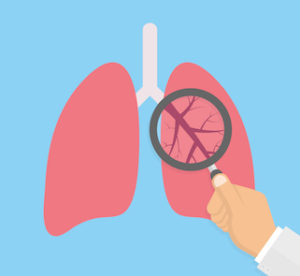Over the years—with partial thanks to the advent of the internet and fake news sites—myths seem to have accumulated regarding the silent killer that is lung cancer. As thoracic surgeons, we would like to set the record straight on some of the more common misconceptions out there and give those in search of answers the information they need.
Myth #1: Only smokers develop lung cancer.
Fact: Approximately 10 to 15 percent of lung cancers occur in non-smokers, and the majority of individuals who develop lung cancer otherwise are ex-smokers. Subsequently, the second biggest risk for lung cancer is overexposure to radon gas. Other factors that increase risk for lung cancer include radiation, family history of lung cancer, asbestos, and other industrial and environmental chemicals.
Myth #2: All abnormal growths in the lung are cancerous.
Fact: There are many benign (noncancerous) and inflammatory causes for abnormal growths in the lungs that are not cancer; a computed tomography (CT) scan alone cannot definitively point to a conclusive diagnosis on its own. There are many descriptions for abnormal growths including a mass, a nodule or a ground-glass opacity. While all of these must be checked by a specialist, many prove to be harmless.

Myth #3: Young people don’t get lung cancer.
Fact: Like most other cancers, lung cancer doesn’t discriminate when it comes to age. For example, incidences of bronchioloalveolar cancer (BAC) seem to be increasing among young, non-smoking Asian women. BAC (now technically classified as lepidic-predominant adenocarcinoma) is a type of non-small cell lung cancer that develops in the tiny air sacs in the outer areas of the lungs. It accounts for two to 14 percent of all lung cancers.
Myth #4: Surgery to treat lung cancer will cause it to spread.
Fact: There is an odd misconception that when lung cancer is exposed to air, it will metastasize (spread) to other parts of the body. This is simply untrue, and surgery is an ideal option for individuals with early stage lung cancer.
Myth #5: Smokers who have been diagnosed with lung cancer shouldn’t bother quitting.
Fact: Quitting smoking is ALWAYS a good idea. In fact, breaking the habit even after a diagnosis may raise the success of surgery, allow treatments to be more effective and reduce the risk of dying from causes other than lung cancer.
Myth #6: There is no way to screen for lung cancer.
Fact: Symptoms such as chest pain, cough or unexplained weight loss may be an indication that lung cancer is present. Also, for those who may be at risk due to their smoking status or other factors, a low-dose computed tomography (LDCT) scan may be recommended to ensure early detection to improve chance for a cure.
If you’ve recently had a lung screening, have been diagnosed with lung cancer, need a second opinion or would like an expert review, our team of specialists will help evaluate findings and devise a treatment plan that is right for you.
As the pioneers of video assisted thoracic surgery (VATS), we have decades of experience in minimally invasive surgical treatments and can provide our patients with helpful information about their conditions. Our Thoracic Group surgeons work in collaboration with a team of specialists, including oncologists, pulmonologists, radiologists, pathologists and nurse navigators.
For more information or to schedule an appointment, contact Thoracic Group today.